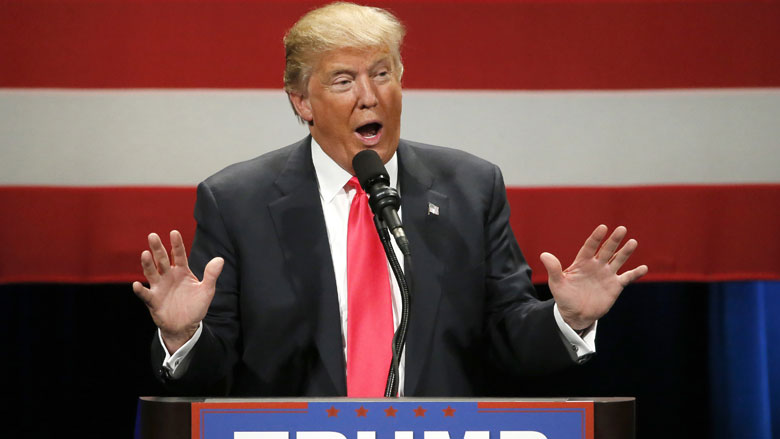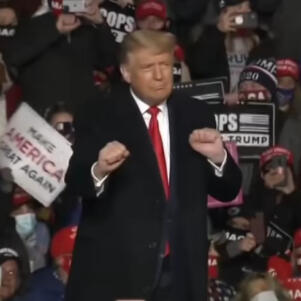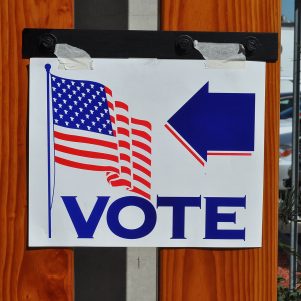How Massachusetts delegates to GOP convention get picked
By Evan Lips | April 6, 2016, 19:12 EDT
 Donald Trump addresses a rally in Milwaukee in April. (AP Photo/Charles Rex Arbogast)
Donald Trump addresses a rally in Milwaukee in April. (AP Photo/Charles Rex Arbogast) BOSTON — After Tuesday night’s Wisconsin Republican primary put another 36 delegates in Ted Cruz’s pocket, Donald Trump’s chances of locking up the GOP presidential nomination and preventing a brokered convention took a serious hit.
Increasingly, it appears that there won’t be a presumed nominee heading into the party’s national convention for the first time in decades.
While Trump won the March 1 Massachusetts primary, that only assured him of first-ballot support from 22 delegates to the national convention. The Republican State Committee will send a total of 42 delegates to the July convention in Cleveland, including 27 delegates elected from nine congressional district caucuses on April 30. In May, the state committee will choose 12 additional delegates.
The remaining three are already set, by virtue of their party roles: State Chairman Kirsten Hughes, National Committeeman Ron Kaufman and National Committeewoman Chanel Prunier. While state Rep. Keiko Orrall of Lakeville narrowly ousted Prunier from the national seat by a 4-vote margin, she won’t step into that role for purposes of the convention.
Meanwhile, the importance of the April 30 caucuses hasn’t been lost on the Trump campaign. On Tuesday night, as Orrall was wrapping up her victory over Prunier, Trump’s campaign blasted off an email to supporters asking for their help “to ensure that Mr. Trump receives the delegates in Cleveland he earned in Massachusetts.”
The email urged supporters “to caucus and vote for the Trump slate of delegates.”
Trump’s March 1 primary victory secured him 22 of the state’s 42 delegates. They are “bound” to his candidacy in that they are obligated to cast the first ballot for his nomination at the convention. Cruz, a U.S. Senator from Texas, wound up with just four “bound” delegates, while Florida Sen. Marco Rubio, who suspended his campaign following a poor performance in his home state, netted eight. Ohio Gov. John Kasich, who is still running even though his sole primary victory was in his home state, also picked up eight delegates in Massachusetts.
But those binders disappear after the first ballot.
Late last month Hughes told WBZ-TV’s Jon Keller that she would support Trump should the real estate tycoon land the nomination. What Hughes didn’t say, nor did Keller ask, is how she would vote at a brokered convention, which would be the GOP’s first since 1976.
The format for a brokered (or contested) convention is complicated as they arise when no single candidate manages to secure a majority of bound delegates before the convention through state primaries and caucuses. The first step at such a convention is known as a “first ballot vote,” or a roundup of the bound delegates. Each of the 27 Massachusetts delegates picked at the April 30 caucuses must pledge to vote for a specific candidate on that first ballot.
But should Trump or Cruz fail to come out of the primary season with less than the magic number of 1,237 delegates, the national convention would move to a second ballot. In that case, about 60 percent of the delegates will become “unbound” and free to vote for whichever candidate they please. This means they would then be free from voting in favor of the candidate that won his or her home state. Additionally, the delegates pledged to Rubio and other candidates no longer in contention become “unbound” once the convention begins and they are officially “out” of the race.
So there’s a potential for delegates to rally around a candidate outside of Trump, Cruz or even Kasich at the convention, should it go to a second ballot or beyond. Prunier, for example, has said she will vote for Cruz should that circumstance arise.
Trump, with 743 delegates so far, needs to capture almost 60 percent of the remaining 882 delegates up for grabs to reach the magic 1,237 number needed to wrap up the nomination. The picture should become clearer after New Yorker’s home state Republican primary on April 19, when 95 delegates are awarded, distributed by Congressional district but with the overall winner taking home an automatic 14.
The prospect of no candidate landing enough bound delegates to prevent a contested convention has led to much speculation about who party elders may recruit to step in as a potential nominee.
Earlier this week, Speaker Paul Ryan (R-Wis.) of the House of Representatives and the 2012 vice presidential nominee emphatically denied rumors that he would seek that role or would accept the nomination should the convention move in that direction. Ryan’s statements came days after Trump announced that he won’t honor his earlier promise to support the party’s presidential pick.
The magic 1,237 number could, however, be achieved on the last day of primary season. On June 7, five states and a whopping 303 delegates will be up for grabs, including California’s 172.
Trump currently leads Cruz overall in the delegate count, 743 to 517, with Kasich holding 143 and 882 still available.









